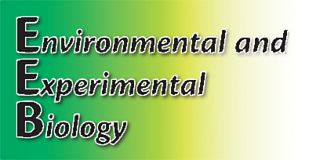
On-line: ISSN 2255–9582

| Faculty of Biology, University of Latvia | ||||||

|
Hard copy: ISSN 1691–8088
On-line: ISSN 2255–9582 Environ Exp Biol (2023) 21: 101–110
|
|||||

|
About the Journal | Retractions | Open Access | Author Guidlines | Current Issue | Archive |
|
Environmental and Experimental Biology |
Environ Exp Biol (2023) 21: 101–110 |
Agriculture has played an important role in human life, both for sustaining life and livelihood. The population explosion has necessitated huge agricultural production. Consequently, there has been modernisation of agriculture not only in farming practices, but also in introducing improved agricultural implements, irrigation, chemical fertilisers, synthetic pesticides, and high-yielding seeds. Agricultural intensification and monoculture make it possible to increase crop production, to a large extent gaining food security, but paying no or little attention to environmental well-being. Intensive tillage leads to soil erosion, nutrient loss, and soil organic carbon loss, which affects the soil biota. Extraction of underground water for irrigation causes groundwater levels to drop and hinders aquifer recharge. Monoculture and the cultivation of high-yielding crops lead to the loss of many indigenous crop varieties and the prevalence of pests and pathogens. Extensive chemical fertiliser application can cause soil acidification, eutrophication, and nitrate contamination in groundwater through leaching. Indiscriminate use of pesticides is a potential threat for non-target organisms, including humans. The agriculture sector contributes a considerable portion of greenhouse gases to the atmosphere. Therefore, the only way to protect our mother earth and create a healthy environment is through sustainable agriculture to ensure food safety and security.